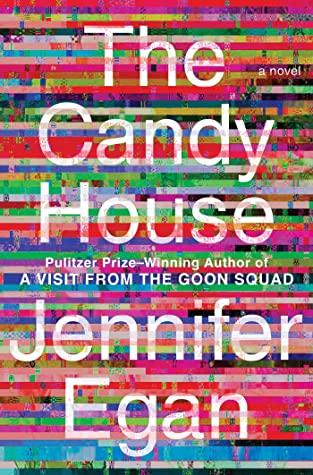I loved Egan’s Pulitzer Prize-winning A Visit from the Goon Squad, although now, nearly 12 years later, I didn’t remember much about the book. Maybe I should have reread it before reading the sequel, The Candy House, but instead I read it much like a stand-alone book. Maybe that’s why I had trouble connecting with it.

Both books are written in a similar fashion, as a series of interconnecting short stories that trace characters over years and go from the past to the near future. The Candy House is built around the idea that a way to upload our memories into a “Collective Consciousness” has been invented and people will now be able to access everyone’s memories. There are upsides to this – improved crime solving, and people can store their memories and upload them in the case of brain injury.
The title refers to the house of sweets in Hansel and Gretel and the idea that what is most tempting comes at a hidden cost. Throughout this book, Egan explores what privacy and identity mean in a world where everyone shares their most intimate thoughts. There are plenty of parallels with our current social media-driven, no-privacy world. The young accept it without question, while those of us who are older try (and mostly fail) to hide from it. One character replays one of her father’s memories and is devastated by his views of what she thought was a cherished childhood moment. But for the most part the Collective is in the background. I would think that actually sharing our memories into a searchable internet collective would be catastrophic in a lot of ways, but Egan instead delves into the more subtle consequences like the search for authenticity, the difficulty of independent thought, and the struggle to filter vast quantities of information into something meaningful.
But knowing everything is too much like knowing nothing; without a story, it’s all just information.
Jennifer Egan, The Candy House
It’s an ambitious book, and one that would probably improve if I’d read it with much greater attention. But I struggled to connect with the characters in the way I did with Goon Squad. I’ve come to like the format of interconnected short stories (like the novels of Elizabeth Strout) because they let you see characters from different perspectives and I enjoy seeing how one character/story connects to the next. The downside, though, is that the reader jumps from character to character before getting to know any of them well. In this book I rarely felt I got to know any of the characters enough to be really interested, and the next stories didn’t go back to those characters enough for me to feel like it was one overarching story. I found myself really interested in a few of the characters, more early in the book than later (Bix, Lincoln, and Molly, for example), but then I wanted more about them and instead the book veered into completely different storylines.
If you loved Goon Squad, you might want to reread that before you dive into this one. Egan returns to the stories of characters Sasha, Bennie Salazar, and Lou Kline, and their families and friends. In my review of Goon Squad I wrote about how much I felt for Sasha’s struggles, and I wish I had felt more in this book.
In the end, while I loved Goon Squad, I can’t say I enjoyed this one. I didn’t like most of the characters, and it felt like a lot of ideas were thrown at me without building a real human connection. Arguably, that is exactly the point of this book, since that is what we’re experiencing every day, and many of us long to turn it all off and go back to meaningful, simple, human connection. This was a very thoughtful, very complicated book – but it felt too “meta” for me. It’s a book about ideas, not a book that felt like it was about real people.
Maybe, if I reread Goon Squad, I would feel similarly. I know that book didn’t work for a lot of people, but it resonated with me. Maybe it’s a change in my own reading tastes – certainly books read differently at different ages. If you’ve read both, what did you think?
Note: I received a complimentary review copy of this book from NetGalley and publisher Scribner. This book published April 5, 2022.

